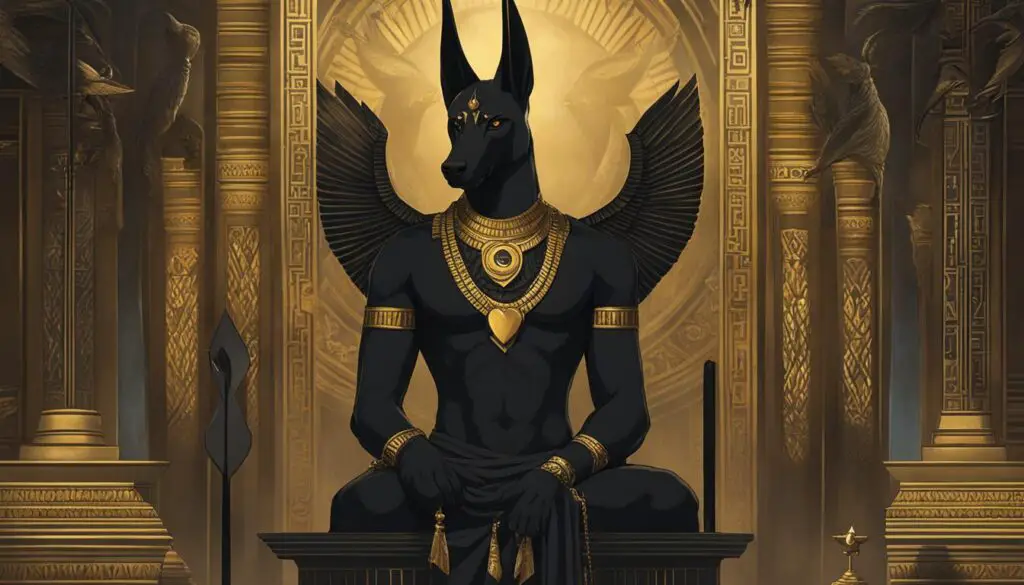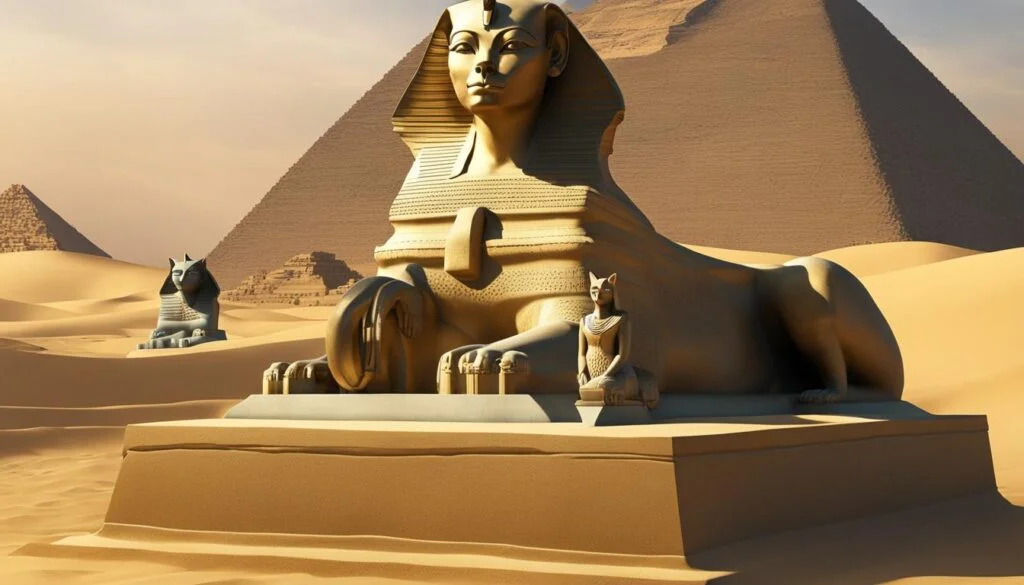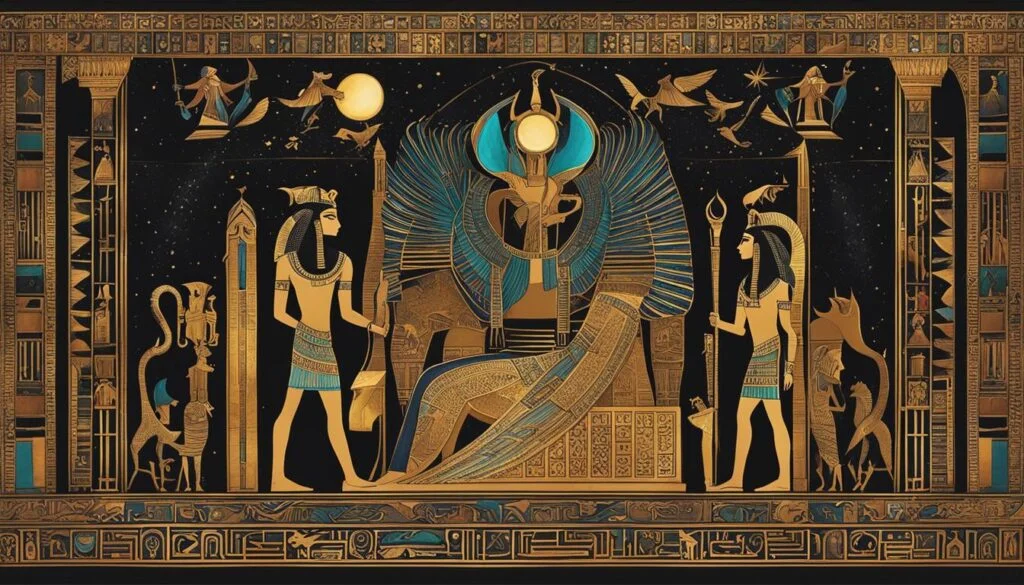Anubis, a prominent figure in ancient Egyptian mythology, was revered as the god of cemeteries and embalming, as well as the protector of graves. His role in the ancient Egyptian belief system regarding the afterlife was vital. Depicted with the black head of a jackal, Anubis was responsible for mummifying the deceased and played a crucial role in the judgment of souls in the Hall of the Two Truths, where he weighed the hearts of the deceased against the feather of Ma’at.
Key Takeaways:
- Anubis was the Egyptian god of cemeteries, embalming, and the protector of graves.
- He played a significant role in the ancient Egyptian belief system regarding the afterlife.
- Anubis weighed the hearts of the deceased against the feather of Ma’at in the judgment of souls.
- If the heart outweighed the feather, the person’s identity would be destroyed; if they were equal, the person would pass into the afterlife.
- Anubis was a prominent figure in Egyptian mythology and closely associated with death and the afterlife.
The Role of Anubis in the Ancient Egyptian Afterlife Beliefs
In ancient Egyptian beliefs, the afterlife held immense significance, believed to be as important as life itself. Anubis, the Egyptian god of cemeteries and embalming, played a crucial role in guiding individuals through the transition from life to death and beyond.
A pivotal part of the judgment afterlife process was the heart weighing ceremony, also known as the “Weighing of the Heart.” Anubis would preside over this ceremony in the Hall of the Two Truths, where the souls of the deceased were brought after their physical bodies had expired.
Anubis would carefully weigh the heart of the deceased against the feather of Ma’at, the goddess of truth and justice. The heart symbolized the essence of a person’s character and their deeds in life. If the heart outweighed the feather, it signified that the person had led an unjust and sinful life. In such cases, the hybrid deity Ammit, part crocodile, part lion, and part hippopotamus, would consume the heart, ultimately leading to the destruction of the person’s soul.
However, if the heart balanced evenly with Ma’at’s feather, it represented a life well-lived and in accordance with truth and justice. In such instances, the deceased would pass through the underworld unharmed and continue their journey into the afterlife.
This heart weighing ceremony demonstrates the integral role Anubis played in the ancient Egyptian afterlife beliefs. It highlights the importance of one’s character and the significance of living a just and righteous life.
Ma’at: The Goddess of Truth and Justice
Ma’at, the goddess of truth and justice, was central to the heart weighing ceremony. Her presence ensured that the judgment process was fair and unbiased. Depicted as a woman with an ostrich feather on her head, Ma’at represented the concept of balance and order in Egyptian mythology.
She embodied the moral and ethical principles that guided Egyptian society, emphasizing the importance of truth, justice, and harmony. The feather of Ma’at served as a symbol of righteousness and provided the standard against which the hearts of the deceased were measured.
The heart weighing ceremony, with Anubis as the overseer and Ma’at’s feather as the measure of truth, reflected the intricate beliefs Egyptians held regarding the afterlife. It demonstrated their belief in the ultimate judgment of one’s character and actions.
The heart weighing ceremony, intertwined with the presence of Anubis and the significance of Ma’at, highlights the complexity and depth of Egyptian afterlife beliefs. It showcases their deep-rooted commitment to justice and the pursuit of a virtuous life.
Anubis: The God of Embalming and Protector of Graves
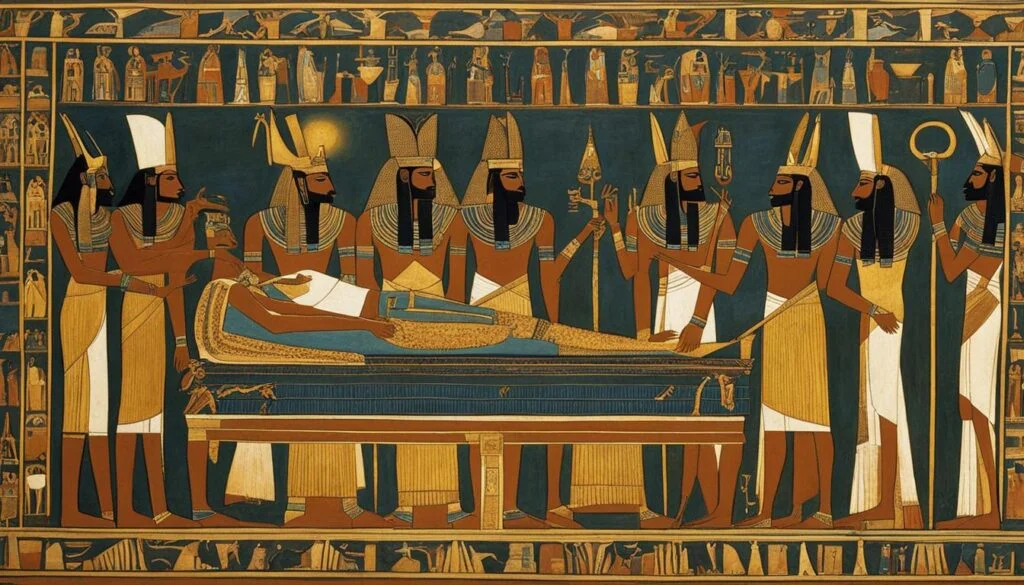
Anubis, one of the most revered gods in ancient Egyptian beliefs, held significant roles in society that revolved around death and the afterlife. As the god of embalming, Anubis played a vital part in the mummification process, ensuring that the bodies of the deceased were preserved for their journey to the realm of the gods. This meticulous process involved removing internal organs, treating the body with preservatives, and wrapping it in linen bandages.
Anubis assumed the responsibility of overseeing the embalming rituals and guiding the embalmers through the intricate steps of the process. It was believed that by preserving the physical form, the soul would have a more successful transition to the afterlife.
In addition to his role in embalming, Anubis was regarded as the protector of graves. Egyptians held the belief that jackals, creatures associated with death due to their presence in cemeteries, had the potential to harm the bodies of the departed. To safeguard the deceased, Anubis was honored as the patron deity of jackals, offering protection and ensuring a peaceful resting place for the departed souls.
Furthermore, Anubis had a close association with Osiris, the god of the afterlife. Osiris was responsible for judging the souls of the deceased, determining their fate in the afterlife. Together, Anubis and Osiris played pivotal roles in the complex belief system of ancient Egypt, where the mummification process and the protection of graves were deeply rooted in the society’s beliefs and practices.
Overall, Anubis embodied the ancient Egyptian beliefs surrounding death, mummification, and the afterlife. As the god of embalming and the protector of graves, Anubis ensured the preservation of the physical body and the tranquility of the final resting place. His associations with Osiris, another prominent figure in Egyptian mythology, solidify his importance in the intricate web of beliefs that shaped ancient Egyptian culture.
Anubis: A Significant Deity in Egyptian Mythology
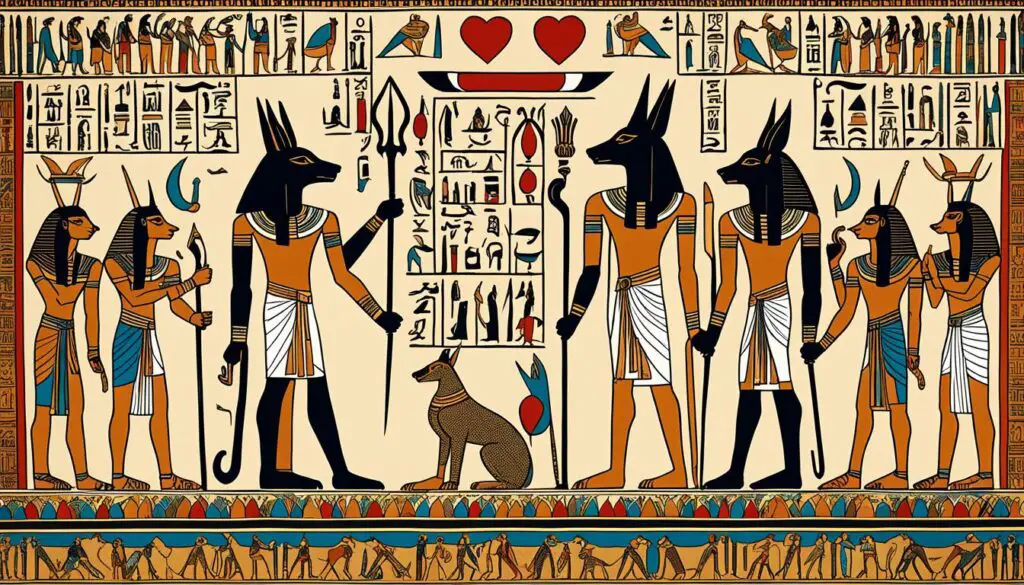
Anubis held a prominent position in Egyptian mythology. He was one of the most frequently depicted and mentioned gods in the Egyptian pantheon. His image was often portrayed as a jackal or a man with a jackal’s head.
Anubis played various roles in different contexts, including being a protector of graves, an embalmer, and a guide to the underworld. His association with death and the afterlife made him a significant figure in Egyptian religious beliefs.
Anubis was also linked to other deities, such as Wepwawet, who was portrayed with a dog’s head and assisted Anubis in his duties. The Greeks later merged Anubis with their own god Hermes, creating the figure of Hermanubis.
In Egyptian mythology, Anubis played a crucial role as one of the most prominent and multifaceted deities. His depiction as a jackal or a man with a jackal’s head represented his association with death and the afterlife. From protecting graves to guiding souls in the underworld, Anubis’s significance in ancient Egyptian religious beliefs cannot be overstated.
Conclusion
Anubis, the Egyptian god who weighs the heart, held a paramount position in the ancient Egyptian belief system and mythology. Revered as the deity responsible for embalming and the guardian of graves, Anubis played a significant role in preserving and protecting the bodies of the deceased. However, his most pivotal function was in the heart weighing ceremony, where he determined the fate of souls in the afterlife.
The heart weighing ceremony was a vital aspect of ancient Egyptian beliefs, emphasizing the importance of balance and order in the judgment process. Anubis carefully weighed the heart against the feather of Ma’at, the symbol of truth and justice. This evaluation decided whether a person’s soul could continue its journey into the afterlife or face annihilation.
Anubis’s enduring presence in Egyptian mythology underlines the enduring significance of death and the afterlife in the ancient culture. His role as the guardian and guide in the realm beyond, and his association with other deities like Wepwawet and Osiris, solidified his position as a prominent figure in the pantheon of gods. The heart weighing ceremony, alongside other ancient Egyptian beliefs, shed light on their intricate belief system and the profound impact it had on their daily lives.
FAQ
Who is Anubis?
Anubis was the Egyptian deity of cemeteries, embalming, and the protector of graves. He played a major role in the ancient Egyptian belief system regarding the afterlife.
What was the heart weighing ceremony?
The heart weighing ceremony, also known as the “Weighing of the Heart,” was a crucial part of the judgment afterlife process. Anubis would weigh the heart of the deceased against the feather of Ma’at to determine their fate in the afterlife.
What happened if the heart was heavier than the feather?
If the heart was heavier than the feather, it indicated that the person had led an unjust and sinful life, and their soul would be destroyed by the deity Ammit.
What happened if the heart weighed the same as the feather?
If the heart weighed the same as the feather, the person would pass through the underworld and into the afterlife.
What were Anubis’s main roles in ancient Egyptian society?
Anubis was responsible for the mummification process and the protector of graves. He ensured that the bodies would be preserved and safeguarded, and the deceased would have a peaceful resting place.
Who was Anubis associated with?
Anubis was closely associated with Osiris, the god of the afterlife, who would judge the souls of the deceased.
How was Anubis depicted in Egyptian mythology?
Anubis was often portrayed as a jackal or a man with a jackal’s head. His image represented his role in death and the afterlife.
What is Anubis’s significance in Egyptian mythology?
Anubis’s enduring legacy in Egyptian mythology highlights the importance of death, the afterlife, and the balance of Ma’at in ancient Egyptian beliefs.


